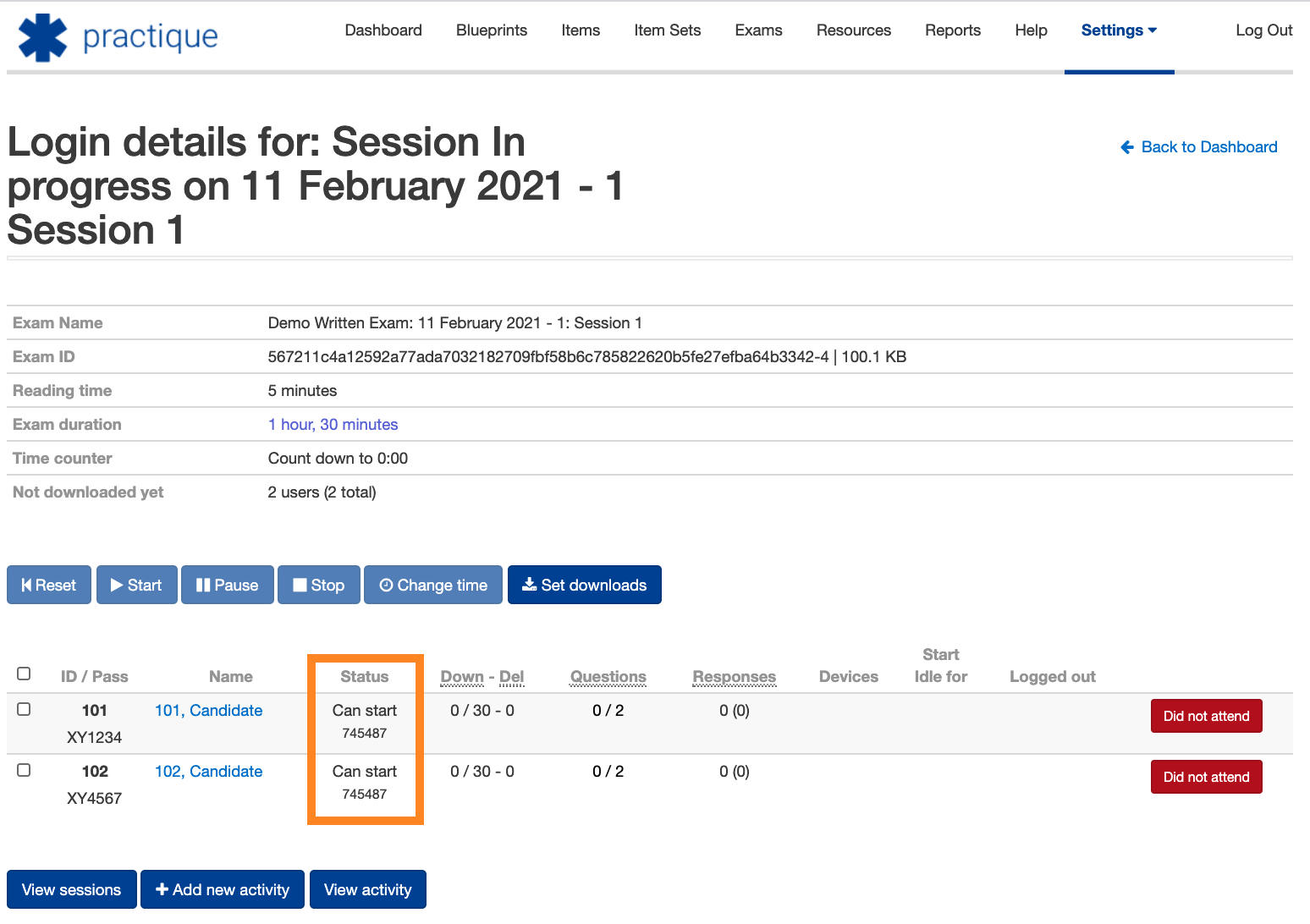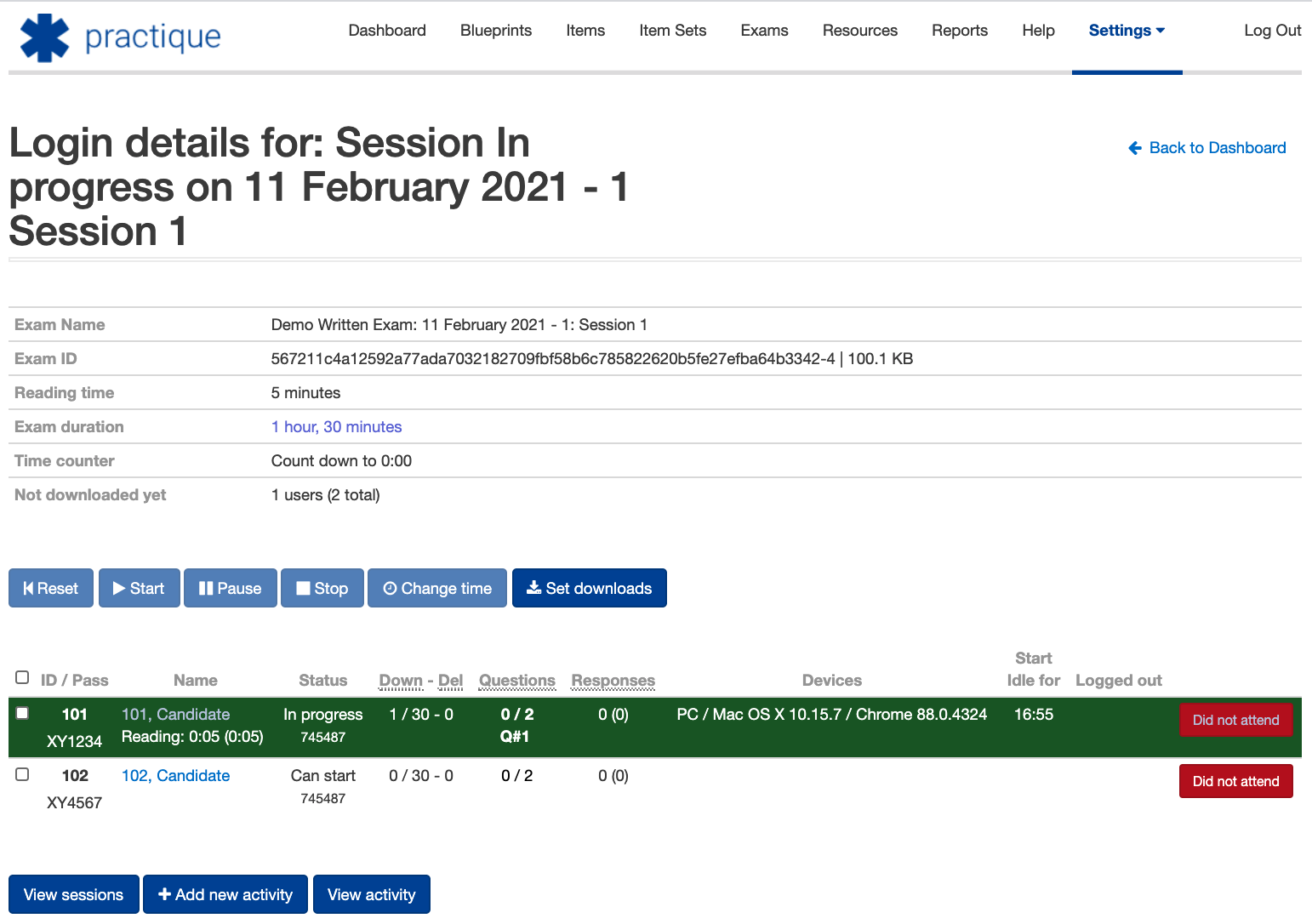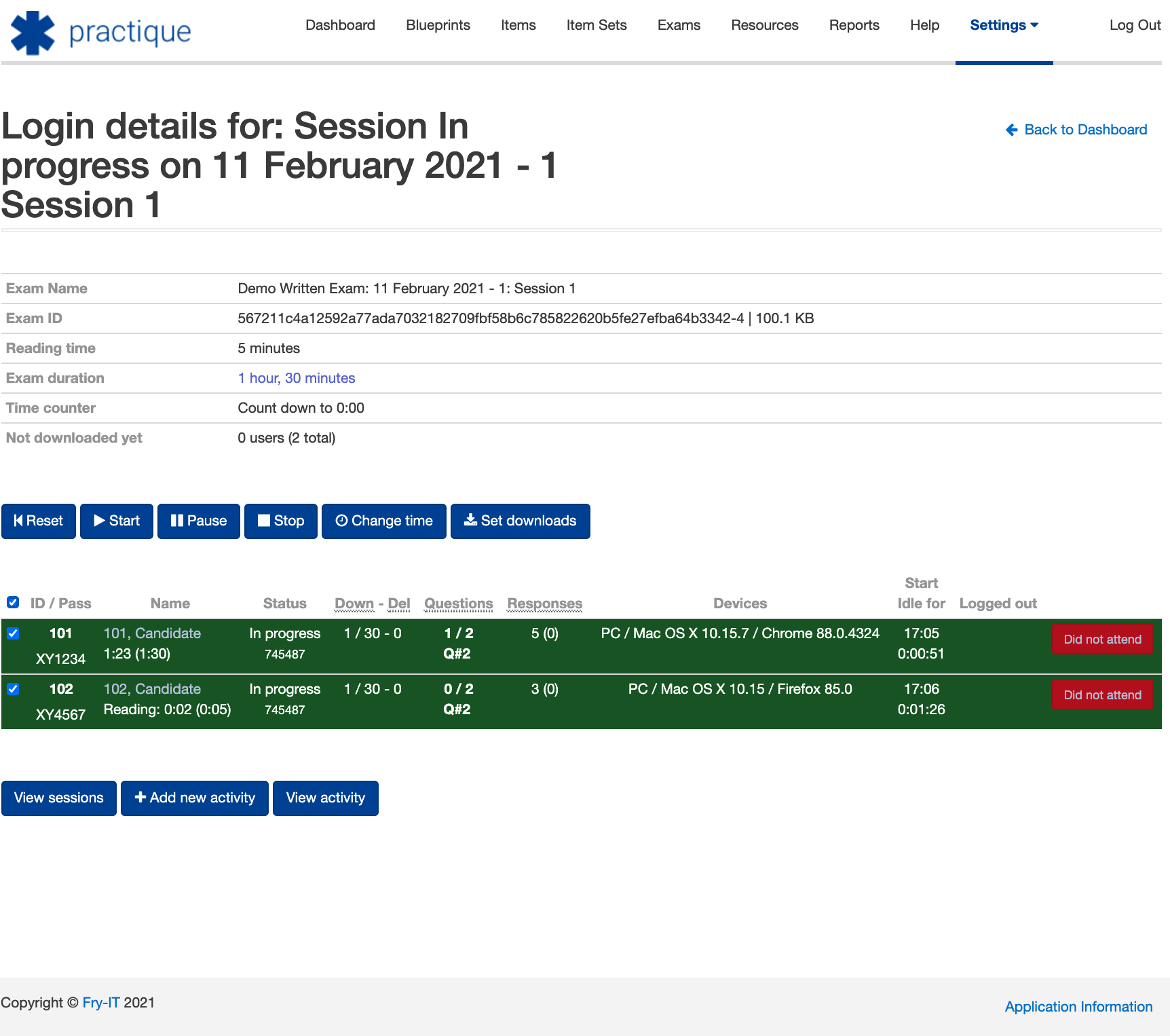Step by step how to activate and configure the exam timing functionality:
Navigate to the ‘Edit exams details' screen for the exam that you want to manage the settings for.
The ‘Exam timing’ field is in the P4B section of the settings.
Select ‘Use exam timing’ from the dropdown options.
A button to configure the exam timing will then show, select this. A pop-up will appear for you configure the exam timing.
The pop-up has five fields:
‘Exam start mode’ - this field has two options:
‘Timer starts when the exam starts’ - select this option if you would like the exam duration timer to begin the countdown for all users when the exam session is started by an administrator. e.g. centrally controlling the time for all users, no matter the time of their login. More commonly used in situations where users are all in one location.
‘Timer starts when the user logs in’ - select this option if you would like the exam duration timer to begin the countdown immediately when the user logs in to Practique. e.g. if you are using proctoring with the exam and users will be accessing Practique at different times over a specified time frame.
‘Counting’ - this field has two options:
‘Count up from 0:00’ - select this option if you would like the timer that the user can see to count up from 0:00 to the number of hour/minutes set for the exam.
‘Count down to 0:00’ - select this option if you would like the timer that the user can see to count up from 0:00 to the number of hours/minutes set for the exam.
‘Exam duration (in minutes)' - enter the duration of the exam in minutes. e.g a 2-hour exam is 120 minutes. Note, this should not include the reading time for the exam if any is permitted, see the next field for instruction.
‘Reading time (in minutes)’ - enter the duration of the reading time in minutes. Note, this is in addition to the exam duration defined in the field above. The reading time function will allow users to access the exam and navigate around the questions, they will not be able to answer any questions until the reading time has elapsed, automatically unlocking the exam for the user. This can be set to '0' for not reading time.
‘Notification of the remaining time (in minutes)’ - define when users will see a warning to advise them how long left of the exam. The message ‘X minutes remaining’ will be displayed in a banner at the top of the P4B page.
Save any changes you have made. These will then be stored. You will not need to use the ‘Save changes’ button on the ‘Edit exam details’ page.
USER SCREENS
When exam timing has been set up with the ‘Timer starts when the user logs in’ option, this is how the user will begin their exam.
When the user logs into the P4B interface through their web browser, the exam will download to their device, the user will be immediately taken into the exam, and the exam will start. If there is reading time, this will be added to the ‘Time remaining information at the top of the screen. There will also be a banner at the top of the screen to let the user know how long the reading time is if this is used for the exam. Once the reading time has elapsed, the exam will be unlocked so the user can submit answers.
Notes:
what if they are offline? Can’t download the exam and so can’t get anywhere?
If the user logs in but the exam session has not been started, they will be helped at a screen
Exam control is the functionality that allows exam administrators to manage users who are taking an exam using Practique. The functionality allows administrators to start, pause, stop and reset users in an exam. With the implementation of exam control, administrators are also able to see more information related to the users that are sitting the exam. The exam control functionality removes the requirement for a user to be sent a PIN to access the exam, unless a user is offline. The information below details the functionality and how it should be used to control your exams in Practique.
| Note |
|---|
For the exam controls to take effect for the user, they must have an active internet connection. |
The exam control actions are located on the ‘View logins’ screen - This page will update automatically
Exam control action buttons:
‘Reset’
The reset action allows administrators to reset the exam for the selected user(s). This action will immediately log the user out of the exam and return them to the login screen. Optionally, you can save ordelete all of the submitted responses (the default is to save the responses). You will require an administrator password to carry out this action. You will need to ‘Start’ the user again if you would like them to be able to log back into the exam. If you choose to reset a user and you are using Exam Timing, when the user restarts the exam, they will be taken back to the beginning of the reading time (if there is some allocated) or the start of the exam time (if there is no reading time).
‘Start’
The start action allows administrators to start the session for the selected user(s), and also to restart a user after they have been paused for any reason.
‘Pause’
The pause action allows administrators to pause the selected user(s) at any point during the exam, providing the user has an active internet connection.
‘Stop’
The stop action allows administrators to stop and end an exam for the selected user(s). This will prevent the user from submitting any more answers, save all their current answers to the server, and then log them out. The user will not be able to log back into the exam unless they are reset, and then restarted.
‘Change time’ (This action will only be available if you are using the ‘Exam Timing’ feature)
The change time action allows administrators to increase and/or decrease the amount of time the selected user(s) have for the exam. This action allows administrators to change the amount of time for both the reading time and the exam duration time at any point that either is active. The user(s) timer will be updated respectively.
‘Set downloads’
The set downloads action allows administrators to set the number of downloads of the exam the selected user(s) are allowed.
Statuses:
Pending
Before the session is started, the screen will show the ‘Status’ of all users as ‘Pending’. Even if a user logged into the P4B interface, they would not be able to access the exam. The exam will download to the user's device. The user will be held at a screen that informs them the exam has not been started yet, and they should wait.
Controlling an exam for users who can start on login
When exam timing has been set up with the ‘Timer starts when the user logs in’ option, this is how the administrator can begin the exam.
Method one to being the exam.
This method is for use if you would like to open the exam for all users in the session to be able to start the exam as soon as they log in.
Complete the setup of the exam, and then publish it to devices from the exam preparation screen.
The exam will display on the dashboard.
Select ‘Start session’. This will immediately allow any users allocated to the session to sign in and begin the exam.
The ‘View logins’ screen
Before the session is started, the ‘View logins’ screen will show the ‘Status’ of all users as ‘Pending’. Even if a user logged into the P4B interface, they would not be able to access the exam. The exam will download to the user's device. The user will be held at a screen that informs them the exam has not been started yet, and they should wait. Issue here - see the screen - what if they are not using proctoring (which is turned off for this demo)
When the session is started, the ‘View logins’ screen will show the ‘Status’ of all users as ‘Can start’
Issues:
This page does not show you the settings that you have configured for the exam timing. It says it is enabled, but that’s all you can find out once you have pushed it to devices, unless I am missing something? I think we should display the settings. https://demo.beta.practique.net/diets/diet/5/edit/?exams
Terminology on the above page is odd when not is use ‘not set’ rather than disabled. Also, this still actually shows the timing controls on the candidate list when the exam timing is not in use…..
Is it ever off? Is this where it turns into exam control?
Things to note:
Users in more than one exam can’t select which exam they want to sit - the system puts them into one - which one?Can start
Once the session is started for a user, the screen will show the ‘Status’ of the user as ‘Can start’. Under the status ‘Can start’ the PIN number for the exam is displayed. If a user is connected to the internet, they will not need a PIN to start the exam. If a user has downloaded the exam, but is offline when the exam is started, they should get in touch with the exam support team, who can provide them with the PIN to access the exam.
In progress
Once a user logs in to start the exam, the screen will show the ‘Status’ of the user as ‘In progress’, and the row with the user information will change to green. (it may not if they lose connection when logging in)
Paused
As an administrator, you can pause the exam for selected user(s) by selecting them and then selecting the ‘Pause’ action at the top of the page. This will pause the user, locking the exam and showing a warning to them that the exam has been paused by an administrator. The exam timer will pause for the user in P4B, and on the view logins screen. The user must have an active internet connection for this control to work. To start the user(s) again, select them and then select the ‘Start’ function at the top of the page, this will allow the user to access the exam again, and restart the exam timer.
Complete
Either the user has finished the exam and logged out, or an administrator has used the ‘Stop’ action to end the exam for a user. The user cannot log back into the exam unless reset using the ‘Reset’ action.
Completing and stopping a session
The exam control functionality will automatically stop the exam session that is running once all of the users have completed the exam and logged out.
The exam session will not automatically stop until all users are in the status ‘Complete’.
If a user has started the exam, and their exam time is complete, but their status is not showing ‘Complete’, (maybe due to them forgetting to finish and log out of the exam), you must use the ‘Stop’ action to put them into the ‘Complete’ status.
If you run an exam session that not all users start (for example a user who Did Not Attend), then you must mark these users as ‘Did Not Attend’, and you must then ‘Stop' these user(s).
As soon as all of the users are in the status of ‘Complete’, the exam session will automatically stop, and the exam will be removed from the dashboard.
‘View logins’ screen information guide:
Checkbox - Top checkbox to select users in bulk. Checkbox per row to individually select each user.
‘ID/Pass’ - Top row information is the ID of the user. The bottom row information is the user(s) password.
‘Name’ - Top row information is the name of the user. The bottom row information is the time remaining followed by the total time allowed in brackets. This changes depending on if the user is in the reading time or exam time.
‘Status’ - Top row information shows the status of the user in the exam. The bottom row information shows the PIN for the exam.
‘Down - Del’ - First number (e.g. 1/30) is how many downloads a user has used of the number available to them. The number after the hyphen is how many times the exam has been deleted from the device.
‘Questions’ - Top row information is the number of at least partially answered questions. Does not include the rejected responses. The bottom row information is the question number chronologically, as the user sees them in the exam. Question randomisation does not impact this.
'Responses' - Number of received responses including amendments (number of rejected responses).
‘Devices’ - This shows the devices and browser with versions that the user has downloaded the exam with, one per line.
‘Start / Idle for’ - Top row information is the time the user logged in to start the exam. The bottom row information is the amount of time the user has been idle for. This is how long a user has not interacted with the system since their last click. This functionality is only activated after the user has made at least one click in the exam interface since logging in.
‘Logged out’ - The time the user finished and logged out of the exam






